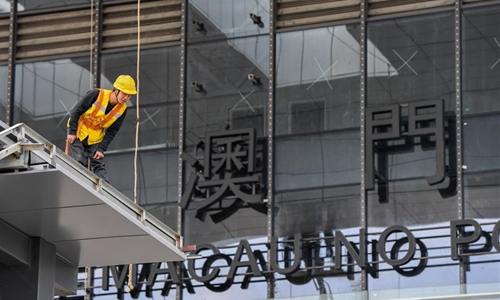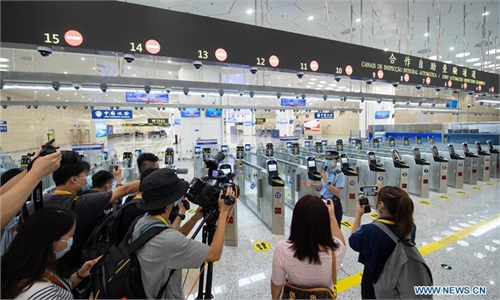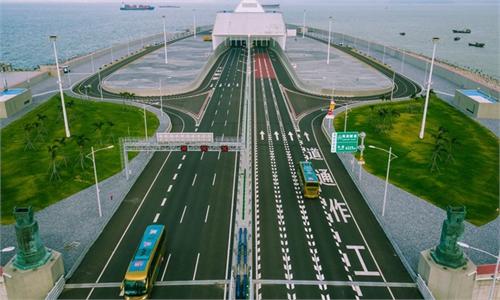COMMENTS / EXPERT ASSESSMENT
Guangdong-Macao in-depth cooperation zone is Macao's historical opportunity

A worker builds the new Hengqin port in Zhuhai, south China's Guangdong Province, December 10, 2019. Photo: Xinhua
China has released the general plan for building a Guangdong-Macao in-depth cooperation zone in Hengqin, an island located in the city of Zhuhai in South China's Guangdong Province, just across the Macao Special Administrative Region.
Hengqin island's special location gives it a natural advantage for the Guangdong-Macao cooperation project. The new plan means more of the Guangdong-Macao cooperation will be carried out on the island in the future. In comparison with the twin city cooperation between Shenzhen and Hongkong, Zhuhai and Macao will also be connected.
To proactively strengthen its cooperation with Zhuhai, further participate in the Guangdong-Hong Kong-Macao Greater Bay Area development and integrate into the nation's new development paradigm of "dual circulation," the project will help Macao embrace broader markets and generate a stronger drive for local economic recovery. With the advantage of the "one country, two systems," Macao can be both a participant of the "internal circulation" and a facilitator of the "external circulation."
To recover from the severe economic impact from the COVID-19 pandemic, Macao can give full play to its advantage as a transfer center. Being adjacent to the Chinese mainland "world factory", with rich international market experience and a prosperous trade environment, Macao has been serving as the transfer hub of many companies. The Special Administrative Region can continue to help introduce capital, resource and talent into Zhuhai to support the local economy.
Macao companies should be more proactive to grasp the large Chinese mainland market. For instance, during the 14th Five-Year Plan (2021-25) , new infrastructure will become the new engine to promote a comprehensive strategic transformation of China's economy. Local companies, especially business in new IT technologies and small and medium-sized enterprises, can participate in the construction of new infrastructure through various ways. Sharing the dividends of the new infrastructure will boost Macao's economy and create more jobs for local residents.
Macao's integration to regional development has entered a phase of fortification. In some areas where Macao and the mainland find differences on their systems, in-depth cooperation can be used to bring breakthroughs and new points of growth.
For instance, the vigorous development of Shenzhen's high-tech industry has largely benefited from the advance in financing channels. In order to better develop high-tech and innovative industries in the future, Guangdong and Macao need to improve financing channel for these enterprises in the in-depth cooperation zone.
The development of the Guangdong-Macao in-depth cooperation zone in Hengqin should be guaranteed by legal and talent support.
In terms of future legal application in the new in-depth cooperation zone, breakthroughs in legal system docking may become necessary. For instance, when cross-regional labor relations disputes happen, should the case apply to laws in Macao or the Chinese mainland? Legal innovation may become possible in the Hengqin in-depth cooperation zone with a pilot scheme involving foreign market entities or those from Hong Kong and Macao.
With regards to talent, the Guangdong-Macao in-depth cooperation zone can take as a reference the cooperation between Shenzhen and Hong Kong. The visa policy for both Chinese mainland and Macao residents should be relaxed. Macao tax policy also applies to Chinese mainland residents working in Macao companies in Hengqin. This will attract more talent across the country to work and start businesses in the in-depth cooperation zone. In addition, the establishment of a professional certification system should be accelerated to attract more foreign talent.
The author is the Dean of the Hainan University Belt and Road Research Institute. bizopinion@globaltimes.com.cn


